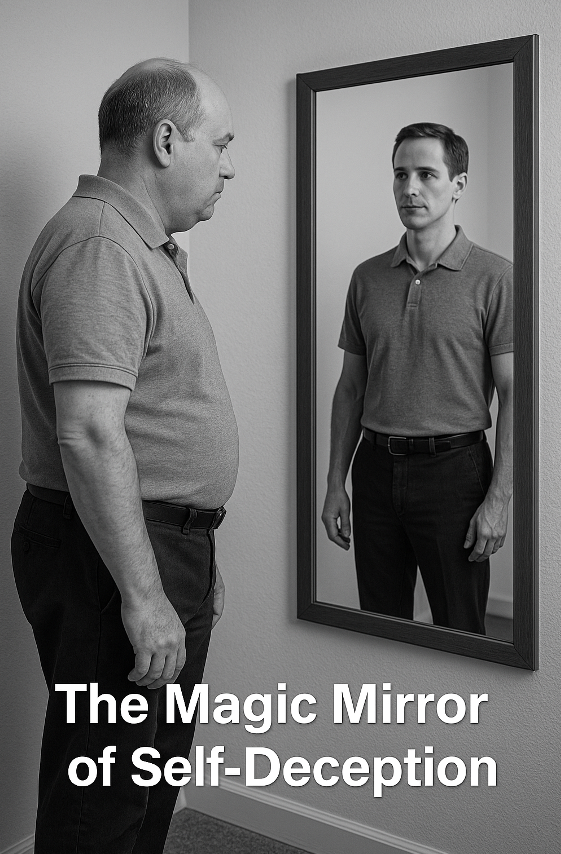Mirror, Mirror
Mirror, Mirror

MIRROR, MIRROR
Mirror, mirror on the wall, who is the one I see?
A mask I wear, a borrowed face, a shadow not of me.
I smile, I nod, I play the part, while truth hides in the hall,
The cracks, the fears, the quiet lies—I've built my secret wall.
Mirror, mirror, do you lie, or do I fool my eyes?
I chase a ghost, a perfect self, with my repeated lies.
But in my depths, I glimpse the whole, the messy, fractured me,
And for the first time, I am mine as is —unbound, unclaimed, and free.
Marc
RESTORING INTEGRITY – WITH WHO I REALLY AM
To become a contemporary Elder, I've discovered that sustaining Elderhood requires one fundamental practice: consciously, ruthlessly, and compassionately focusing on my integrity.
But I don't mean integrity in the watered-down sense of "I don't lie." That's the smallest corner of it.
For me, integrity means being whole, complete, nothing left out, unbroken, with who I truly am. The unabridged edition of me.
The Hidden Cost of Self-Deception
I know nothing undermines my integrity more than self-deception. I've had a lot of practice. How could I not?
Self-deception is a norm in our culture. Can't look bad to others? Can't be found out? Can't be exposed? They don't need to know. Worse, what if they found out?
Yet I discovered something profound: those areas where I deceive myself become the exact limits of who I am—actually, who I could be. My self-deception was like using an electric collar to keep my dog in the yard. It's called a containment system. Self-deception was my containment system.
How I Began Catching Myself
This practice of catching myself when I found myself self-deceiving was not difficult. All I had to do was focus my attention on those dark corners of my life—the ones I ignored or found myself justifying, rationalizing, or the ones I kept making excuses for.
I noticed the lies. Self-deception would let me lie to myself even though I knew it wasn't true. It was when I knew what was coming out of my mouth was not true, but I said it anyway.
All my examples would be messy, human, ordinary—just like your self-deceptions. And believe me, you've got at least a few. Relationships. Work. Health. Unspoken needs. Self. Children. Neighbors. Politics.
The goal isn't perfection. It's ownership of all that I am, and having that be whole, complete, nothing left out, unbroken. That would be the integrity with 'who I truly am,' unrestricted, without discomfort, without pretense. For me, that is boundless freedom.
MY LESSONS LEARNED ABOUT SELF-DECEPTION
Through years of this practice, I've identified the patterns. Here's what I discovered about how self-deception operates:
Self-deception was when I dodged those parts of me that I pretended didn't exist.
Self-deception resided in those areas that I was afraid to have exposed.
Self-deception was easy to find. All I had to do was note what I'd been telling myself about those parts that were unacceptable.
Self-deception harmed my relationships, as I became protective of areas where I was hiding, fearing judgment, rejection, or conflict.
Self-deception were those internal voices that belittled, criticized, and castigated me, her, him, them, or it.
Self-deception makes you right.
Self-deception was like trying to hide a goat in my closet. I could shut the door, push it back, maybe even cover it with a blanket—but it's still there. It
still bumped into everything, still left footprints, and still smelled.
The Deeper Mechanics
Self-deception operated quietly, like a shadow in my mind, shaping my choices. It convinced me that avoidance is safety, that denial is protection, that pretending makes life easier.
Self-deception colored my perceptions, distorted my judgments, and subtly manipulated my behavior.
Self-deception limited my authentic self-expression.
Self-deception in my relationships fostered resentment, misunderstanding, and distance.
Self-deception kept me small, reactive, and trapped in patterns I pretended weren't there. By the way, my favorite patterns were passive-
aggressive and victim.
Self-deception eroded integrity, wisdom, and presence—the very qualities necessary to step fully into Elderhood.
The Hidden Benefits
So, if these were the costs of self-deception, why did I keep doing it? Because there were benefits:
The benefits of self-deception were that I didn't have to own who I was, be responsible for the whole me, and most importantly, I got to be right about me, them, and it.
But here's what I learned: Elders have nothing to hide from themselves or anyone else. And that, for me, is unmitigated freedom.
REFERENCES & INTERPRETATIONS
· "Most men do not really want freedom, because freedom involves responsibility, and most men are frightened of responsibility." – Sigmund Freud
Insight: Denial of responsibility is a form of self-deception.
· "The first principle is that you must not fool yourself—and you are the easiest person to fool." – Richard Feynman
Insight: Self-deception is universal and requires constant vigilance.
· "We are never so defenseless against suffering as when we love, never so helplessly unhappy as when we have lost our illusions of self." – Sigmund Freud
Insight: Clinging to illusions is a classic self-deception.
· "Most people do not really want to know themselves." – Carl Jung
Insight: Avoidance of inner truth is a subtle but pervasive self-deception.
· "All men have their faults, but the greatest fault is the inability to see them in oneself." – Baltasar Gracian
Insight: Self-deception blinds us to our own flaws.
· "The greatest deception men suffer is from their own opinions." – Leonardo da Vinci
Insight: Our beliefs can mask reality more than any external influence.
· "We deceive ourselves when we pretend that our actions are caused by something other than our own choices." – Epictetus
Insight: Self-deception is avoiding ownership of choice.
· "To know oneself is the beginning of all wisdom." – Ralph Waldo Emerson
Insight: Self-deception doesn't let you know yourself.
SUMMARY REPORT
What I now understand is this: When I can accept with grace, humor, and appreciation who I am—the whole, complete, uncut me—I no longer require self-deception.
Now I can recognize when I fall into its trap.
